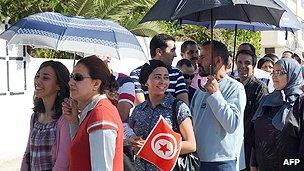Tunisians embrace democratic life
- Published

More than 90% of Tunisia's registered voters queued in the hot sun to cast their ballot
The first election to materialise from the Arab Spring took place in Tunisia on Sunday and more than 90% of those registered turned out to vote.
In the courtyard of a secondary school in central Tunis, the sun was pounding down by 10:00 in the morning.
The queue snaked one way, then doubled back and then twisted again, filling the space with patient, cheerful people.
"I've been standing here in the sun for three hours," one man said. "We are suffering here, but you know, it's a beautiful kind of suffering."
"How long have you been waiting to vote?" I asked.
The answer was irresistible.
"Forty years," someone said.
"Who do you think will win the election?" I asked another voter.
"Sir," he said, "we will all win. We are voting freely for the first time. It means we have already won."
There was a generosity to the day too. People who had waited hours happily stepped aside to allow the elderly to jump the queue, even though this slowed everyone else down.
But when a prominent party leader tried to do the same thing, Tunisians flexed their newly acquired democratic muscle.
Rachid Ghannouchi, leader of the moderate Islamist party Ennahda, turned up at his polling station surrounded by television crews and made straight for the door.
"Hey," someone shouted, "where do you think you're going? Can't you see there's a queue?"
Soon the rest of those waiting joined in. Chastened, the modest Mr Ghannouchi took his place in line and waited like everyone else.
There are not many days in a life spent chasing news that are as unremittingly positive as this one was - that remind you that the right to vote is held most precious by those who have long been denied it and who are exercising it for the first time.
There was something pleasingly fresh about the campaign too.
There were no spin doctors, no rebuttal units, no focus groups, no electoral machines to harvest votes. The glib and oily arts of the more mature democracies have yet to take root here.
It was politics on the pavement - Tunisians rejoicing in the right to disagree in public, to press a leaflet into the hands of a neighbour in a shopping centre, to post a flyer on a billboard.
Ten months ago, Tunisians would have been jailed for doing any one of these things. And yet more than 100 registered parties emerged to contest the election.
Crucially for the Arab world, none of them was backed by an armed militia. The campaign really has been about argument - about competing visions of the country's future.
And the conservative vision prevailed.
Mr Ghannouchi, who was sent to the back of the queue by his neighbours, has since emerged as the most powerful man in the country.
Why have Tunisians chosen the Islamists? I sat in a cafe in a working-class neighbourhood where unemployment is high and disillusion - and disgust - with the old dictatorship is deepest.
I asked the Tunisian people why they voted Ennahda and they did not talk about religion. They talked about honesty in public life, about the need for a government that would not steal from the people.
This is the reputation that Ennahda brought to the electoral table. They won not because people wanted an Islamic state but because people thought they represented the best chance of a clean break with the corruption and venality of the old regime.
In the smarter, wealthier, less socially conservative neighbourhoods, where almost no-one wears the Islamic headscarf, young people hang out in pavement cafes in streets that could easily pass for suburbs of Nice or Marseilles.
Here, there was unease but not widespread alarm. But no-one expected that women would suddenly be required to cover themselves up, or forced from the workplace. In fact, gender equality in the workplace, including equal pay for equal work, was one of the policies of the Islamist party.
"Are you afraid of an Islamic dictatorship emerging here?" I asked the leader of one secular, extremely liberal party.
"No," he said. "Don't think of Tunisia as a battle between Islam and democracy.
"Think of it as a battle within a democracy between two competing visions for our future - one conservative, rooted in religious observance, the other is progressive, modern and forward-looking."
Tunisia has a strong, educated, self-confident middle class that, it is now clear, has a very developed understanding of the dynamics of democratic life.
This country is in the cockpit of something new in the world - a real, indigenously rooted, Arab democracy.
Tunisians toppled their dictatorship. Tunisians pulled off this remarkable election. Tunisians own their own revolution. They have embarked on a future of their own choosing.
Yes, these are early days. Yes, a lot can still go wrong. But right here, right now, this feels like a moment of real consequences, and great promise.
How to listen to From Our Own Correspondent:
BBC Radio 4: A 30-minute programme on Saturdays, 1130.
Second 30-minute programme on Thursdays, 1100 (some weeks only).
Listen online or download the podcast
BBC World Service:
Hear daily 10-minute editions Monday to Friday, repeated through the day, also available to listen online.
Read more or explore the archive, external at the programme website, external.
- Published17 October 2011
- Published25 October 2011
- Published21 October 2011